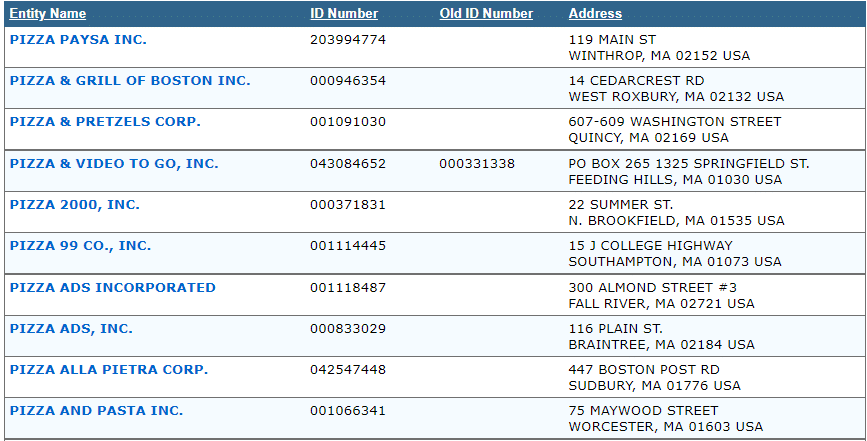The easiest option is to file with companies that also take care of business name reservations.
 |
Northwest Registered Agent |
|
Visit Northwest |
 |
ZenBusiness |
|
Visit ZenBusiness |
 |
Bizee |
|
Visit Bizee |
One of the first steps to take when starting a Massachusetts business is to perform a Massachusetts Business Search. The Massachusetts Secretary of the Commonwealth keeps records of Massachusetts business entities that exist or have dissolved. The database is free to use and makes it easy to find existing businesses and check if a business name may be available.
How to search Massachusetts business names
Searching for Massachusetts businesses is done through the Secretary of the Commonwealth of Massachusetts site.
Massachusetts Corporations and LLCs are searchable by the following criteria:
- Business Entity
- Business ID
Massachusetts entity name
The “Name” search query is the most commonly used when performing a business entity search. Enter in the business name and select “search,” and the database will generate any names related to the name entered.
There is no need to enter phrases like “LLC, Corp, or other naming designations as the database will generate results for every type of entity.
Search by entity ID
Each Massachusetts corporation has an associated filing number. To search by filing number, enter the ID number and select “Search.”
Massachusetts corporation search name status
If a business struggles to think of a good business name, one way to generate ideas is to look through the search results list to see if any expired names could fit the business.
For instance, if someone wanted to open a Pizza restaurant, enter the word “Pizza” into the search field to generate a list of expired and active names to see if any expired names could fit.
If an expired name is of interest, it is recommended to confirm that the name is available by calling the Massachusetts Secretary of Commonwealth at 617-727-7030.
Trademark search
One thing to remember is that even though the desired Massachusetts business name may be available, it could have a registered trademark.
Performing a trademark search through the Trademark Electronic Search System before selecting a business name could prevent headaches in the future.
Next steps
1. Check if the domain name is available
- Many of the .com domain names with six or fewer letters are taken, so getting creative may be necessary. Websites like Namechk and GoDaddy can help filter available domain names and suggest alternatives that may be a good fit.
- While a .com is the most familiar domain extension used, extensions like .co, .net, and .io are becoming more commonly used as the internet ages and can be a good fit once a company name is selected.
2. Check if the social media name is available
In the digital age, it is essential to have a solid social media presence. Customers will often check sites like Yelp and Google Reviews to gauge what others think about a business. Some other tips on social media for a Massachusetts business entity:
- Having a strong social media presence for small businesses is an excellent way to boost organic presence on the web, impress customers, and build awareness.
- Unfortunately, like domain names, social media handles are often hoarded. Make sure to check sites like Instagram, Twitter, Facebook, and Pinterest to ensure the handle is not registered.
- If the handle is available, lock the username in place to reserve it.
- Software platforms like SocialPilot can help simplify managing various social media platforms.
3. Register Massachusetts business entity
After selecting a business name, businesses can register their incorporation with the Secretary of the Commonwealth of Massachusetts.
Another option is to file with companies like Northwest Registered Agent, Bizee, or ZenBusiness, which can take care of the filings for as little as $0 plus state filing fees.
For further step-by-step instructions on how to file your LLC check out this Massachusetts LLC Guide.
4. Register TAX ID/EIN with the IRS
An EIN is a nine-digit number that identifies a business for tax purposes. Think of it as a social security number for businesses. Filing your EIN. for a limited liability company (LLC.) is straightforward and can be done online. Massachusetts corporations can register for a Tax ID for $79 with Swyft Filings.
5. Create a logo
Similar to selecting a good business name, businesses with a great logo impress customers, help distinguish themselves from the competition, and create a positive visual memory of your unique business services for customers.
With the emergence of freelance marketplaces, it is easy to get a logo done on Fiverr in 24 hours or less.
6. Write a business plan
Writing a business plan can help organize business owners’ ideas and create a pathway for businesses to follow. Having a professionally written business plan also impresses investors and helps create accountability.
Liveplan.com is a business plan software that can help make the process easy as they have over 500 sample plans to choose from.
Businesses that form partnerships should consider having a professional operating agreement.
7. Open a business bank account
Having a business bank account is required for businesses as it helps keep business and personal finances separate. It also helps build business credibility when business loans are needed to grow the business in the future.
Businesses must have a business mailing address to open a business bank account and cannot use a PO box as their primary mailing address.
Lili and Novo are online banks that specialize in working with freelancers and entrepreneurs.
We recommend Novo for small business banking. Built for small business owners, entrepreneurs, and freelancers.
8. Setup an email account
Google Workspace can help set up an @yourcompany email address for as little as $6 per month.
Plan on running your business well. Google Workspace helps with email addresses, team collaboration, productivity, and more.
9. Register a trademark
One of the easiest ways to file a trademark is through LegalZoom. They have options to file by themselves or pay an additional fee to have an attorney take care of the filings.
Massachusetts business structure naming considerations
When selecting a Massachusetts business name, it is important to understand the different naming requirements for each entity type.
Sole proprietorships and partnerships
In Massachusetts, sole proprietorships do not have to file with the corporation division to begin business operations. Sole Proprietorships typically operate under a person’s name, so there is no need to perform a business name search in most situations.
Like Sole Proprietorships, Partnerships are relatively easy to file and generally include all partners’ last names (ex: Smith, Jones, and Lasalle).
LLCs
LLCs are separate legal entities that separate owners’ business interests, debts, and liabilities from personal responsibilities. Names for LLCs are required to be filed with the Massachusetts Secretary of State and must be unique.
A few reminders when naming LLCs:
- Massachusetts business names must include the words “LLC, LLC, or the phrase limited liability company. “LLC” is most commonly used after a business name, so we recommend using that abbreviation when filing Massachusetts articles of organization.
- An LLC name should not include the terms Inc., Corporation, Corp, or Incorporated in the LLC name.
- The State may not approve a Massachusetts business name if it is not clearly distinguishable from the other business.
Corporations
Corporations, like LLCs, are separate legal entities that require filing with the corporation commission. Corporations are fairly complex and typically used by large companies looking to issue stock and attract investors.
Corporation naming considerations:
- Corporations must include “corp”, “corporation”, “Inc”, “limited”, or “company” in the business name to indicate that it is a corporation.
- S Corporations are subject to the same naming requirements as traditional corporations.
- Professional Corporations must indicate that they are using “professional corporation” by using the letters “PC” instead of typical corporate designation.
FAQs
Is there an annual report requirement in Massachusetts?
Massachusetts nonprofits must file annual reports every 10 years indicating that they are still in business. Reports can be filed through the Secretary of the Commonwealth of Massachusetts website.
Is a registered agent required to register a startup in the State of Massachusetts?
A registered agent is someone that is designated to receive official papers for your LLC, LLP, or corporation. Individuals can act as their registered agent as long as a physical address (p.o. box is not allowed) is formed in the same State.
One of the main benefits of using a third-party registered agent service company is that it adds a layer of privacy between the business and the general population. The registered agent company receives all documents on a business’s behalf and can mail them to you privately. Northwest Registered Agent offers free mail forwarding and has a great reputation in the industry.
Where can I find information on Massachusetts business licenses?
Business license information can be found on the Mass.gov website.
Why should I file a trademark? How do I file?
A trademark gives entrepreneurs legal protection over their brand. As your Massachusetts business grows, competitors tend to pop up to try and compete against you in the marketplace.
A trademark sends a message to competitors that may be looking into your niche that you mean business.
Trademarks also grow in value as your business grows and increases brand recognition. If you are ever hoping to sell your business down the line, having a solid trademark can add to your valuation.
Suppose your business has a physical product that you are looking to sell on sites like Amazon. In that case, there are unique features businesses can access with a registered trademark, which helps prevent infringement on your products.
- Because the database is very complex to navigate, some people prefer to pay companies like LegalZoom to do the work for them.
- Check out the LegalZoom Trademark options to see if it makes sense for your limited liability company once you have zeroed in on an entity name.
A DBA (doing business as), or trade name, is a fictitious business name that companies operate under for business outside of the formal LLC name. DBA names are filed with the Massachusetts Secretary of the Commonwealth or can be filed with companies like Bizee.
Here are a couple of benefits of DBAs:
- Expansion possibilities: having a DBA enables businesses to expand past their original business and without starting a new business entity. Simply creating a new DBA and operating under the existing LLC is all that would be needed.
- Privacy: One of the best benefits of having a DBA is that it gives businesses the ability to operate under a fictitious business name and not have owners’ personal names revealed publicly.

